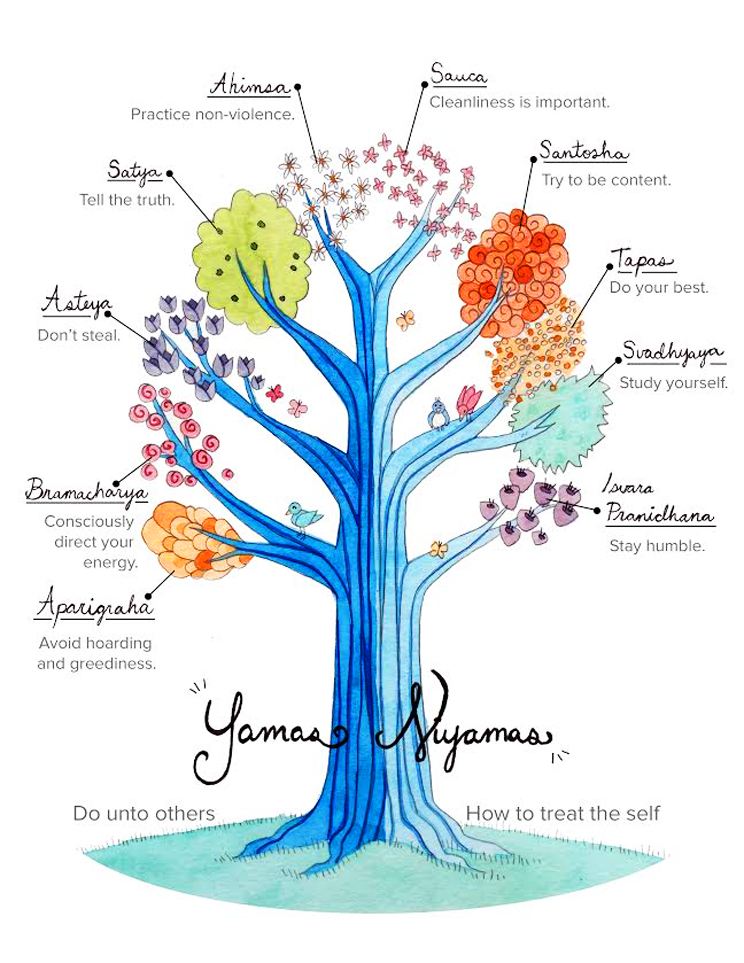
Yoga philosophy can be studied beyond just the physical practice. The philosophy behind this ancient system of exercise and meditation also forms the basis for its practice. One could spend a lifetime studying all the philosophical ideas involved in yoga. There are many branches of yoga philosophy. Each branch has its own benefits and unique features. These are only a few of the many branches of yoga philosophy. Read on for some of the most important principles and ideas of yoga.
The Yoga Philosophy program's chapter one teaches students how to practice yoga. The next two chapters are about cultivating certain attitudes and practices in order to improve your practice of yoga. These characteristics are especially important: cultivating kindness, compassion joy, indifference, and joy. These qualities are vital for yoga practice. You will also find information on detachment as well as restraint of the mind in these texts. These concepts are among the most important in the books.

Patanjali has written the fifth chapter in the Yoga Sutras. This chapter describes the philosophy of Yoga. This text is considered to be one of the six orthodox Vedic Schools. Raja yoga's roots are in Samkhya. It is an ancient philosophical system that has influenced Buddhism. Samkhya is accepted as reality by the Yoga system. Ishvara, also known as God, is considered a special Purusha that transcends the law and consequences of Karma.
The intellectual content of the Yoga philosophy is largely based on the Samkhya philosophy. Samkhya thinking assumes God is real and serves as a guide for those who seek spiritual freedom. According to Samkhya, spiritual liberation is attained when the spirit is free from matter, ignorance, and illusion. Samkhya's fundamental concept is the idea of the universe and its evolution through its five stages. These stages are called asana. It attempts to reverse the order of the world through dephenomenalization. This can be achieved by the use of rebirth. The world eventually returns back to its purest state.
Yoga's ultimate goal is to liberate the individual from all worldly suffering, as well as the cycle of death and birth. Yoga practice teaches an individual how to control their body, mind, and transcend desires. Meditation will allow the yogi to reach a blissful union of the supreme Reality with their own soul. This state of total self-collectedness will be the result of the yogi's understanding of the yogic philosophy.

Yoga philosophy has a long and complicated history. It is divided into two main schools, each with their own distinct focus. The west was the origin of the Tantric school and the Yoga Sutras School, which were both founded in 400CE. Yoga Sutras tradition teaches that there is only one true nature to the world. Pure awareness (purusha) is the basis of all things and thoughts. Meditation is the best way to discover this true nature.
FAQ
Here are five ways to improve your emotional and mental health.
-
Exercise - Physical activity improves brain function and increases energy levels.
-
Sleep - It is important to get enough rest in order to reduce stress and anxiety.
-
Nutrition - Eat healthy foods such fruits and veggies to keep your body strong, energized and happy.
-
Meditation - Regular meditation reduces stress and anxiety.
-
Socialization - Spending quality time with family and friends keeps us happy.
Are mental health and work more important than mental health?
Everybody needs to be healthy, especially when they are working. Try to find a way to unwind after work if you feel stressed.
Talk to your boss or supervisor if you feel stressed. You may find solutions to your stress through them.
Your physical health is important too. It's important to eat right, exercise regularly, take enough rest, and get plenty of sleep.
What can I do to prevent mental health problems?
It is not easy to prevent mental health problems. These are some tips to remember:
-
Don't drink alcohol. You can have a negative effect on your mood and increase your chance of getting depressed.
-
Avoid using drugs. Avoid drugs. They can alter brain chemistry, making you feel worse.
-
Get enough sleep. A lack of sleep can cause anxiety and depression.
-
Exercise regularly. Exercise makes you feel happy and releases endorphins.
-
Consume healthy food. Do not eat junk food. You will feel lethargic and depressed.
-
Spend quality time with those you love. It can be a great way to improve your mood.
-
Have fun. Have fun with your life.
-
Social media can be exhausting. You may feel isolated or lonely on social media.
-
Be kind to yourself. Treat yourself nicely, even if you aren't feeling great.
-
Ask for help. If you're having trouble coping, then ask for help. Talking to someone you trust can be a help.
-
Remember that it's okay to cry. Crying helps you release tension and stress. It doesn't mean anything bad happened.
-
Keep busy. Try to find something you like.
-
Good hygiene is essential. Neglecting to maintain a clean environment can lead to a feeling of unattractiveness and lackluster appearance.
-
Stay connected. Stay positive by connecting with others.
-
Learn how you can relax. Relaxation techniques such as meditation and yoga can help you to cope with stress.
-
Find meaning and purpose in what you do. Finding purpose in your work and hobbies can give you a sense of fulfillment.
-
Concentrate on the moment. You won't worry about the future if you are focusing on the moment.
-
Set goals. Setting goals can motivate you to achieve them.
-
Do something for yourself. Being kind to yourself can help boost self-esteem.
-
Practice gratitude. Gratitude helps you to appreciate all of the good things about your life.
-
Volunteer. Volunteering can be an enjoyable way to spend time and make a difference in the world.
-
Give back. Giving back can help you feel fulfilled.
-
Be aware of warning signs. You should be aware of warning signs and reach out for assistance if you notice any changes.
Why is it important that students have a healthy mind?
Mental health is vital for students because they need to be able to focus on school and do well academically. If you don't feel good, you won't be able to perform well in school. Students suffering from depression are more likely to miss class, which can lead them to get poor grades. This could result in students dropping out high school and possibly even college.
If you're struggling with depression, you should speak to your parents or teachers. These people will be able help you receive the care that you require.
It's important to note that not everyone who struggles with depression needs medication. Talk therapy can be very effective for many people. Counselors are a good option if you want to get help.
How can one determine if they have a mental health condition?
If a person experiences symptoms that affect their daily lives, they may be diagnosed as having a mental disorder. Symptoms of mental illnesses vary from person to person. The most common signs are: sadness and anxiety; feeling guilty, hopeless; lonely; depressed; confused; worthless; guilty, suicidal.
A person can also be diagnosed as having a mental disorder if they fulfill at least three of the criteria listed below.
-
Disturbed thoughts and feelings
-
Disturbed behavior
-
Disturbance in functioning
-
Reduced ability to relate to others
Statistics
- According to the National Alliance of Mental Illness (NAMI), one in five Americans experiences mental health issues which translates to more than 40 million adults a year. (doctorondemand.com)
- Appropriate nutrition and exercise are likely among the most efficacious and cost-effective positive mental health interventions. (ncbi.nlm.nih.gov)
- Similarly, for positive mental health, there is likely to be substantial agreement about some typical components (e.g., resilience to stress) 6, and controversy about more atypical components (e.g., career consolidation). (ncbi.nlm.nih.gov)
- Neuropsychiatric diseases are the leading cause of death and disability in the U.S., accounting for 18.7 percent of all years of potential lifespan loss and premature mortality.
- Similarly, while there is some agreement about the boundaries of typical mental disorders 2, there is likely less agreement about those for positive mental health. (ncbi.nlm.nih.gov)
External Links
How To
What are the Key Factors that Make Mental Health Vital?
Mental health refers both to your mind and your emotional well-being. It influences how you think, feel, act, relate, relate, sleep and eat.
Everyone should be concerned about mental health. However, when we speak of mental health we often refer to it as depression. Depression is a serious illness that affects millions of Americans every year.
A medical doctor must treat depression, which is known as clinical depression. However, there are many forms and severity levels of depression.
The National Institute of Mental Health defines depression as "a common mood condition that is characterised by a depressed mood almost every day, loss of interest and pleasure in almost any activity, guilt or low self worth, disturbed sleep or appetite, poor focus, and thoughts of death, suicide, or other mental disorders."
There are many ways that people experience depression. People may feel sad, helpless, irritable and anxious. They might also feel worthless, guilt, worthless or tired. Others may easily feel numb, empty, restless, agitated, angry, fearful, and/or cry. Others might feel nothing.
Depression can be treated. Depression can be treated with medication, psychotherapy, exercise and diet modifications. If depression isn't treated, it can cause serious problems at home and school as well as in your relationships.
While depression is more common among women than in men, it is also more common in boys and men. Depression is the leading cause for disability worldwide in men and women aged 15-44 years.